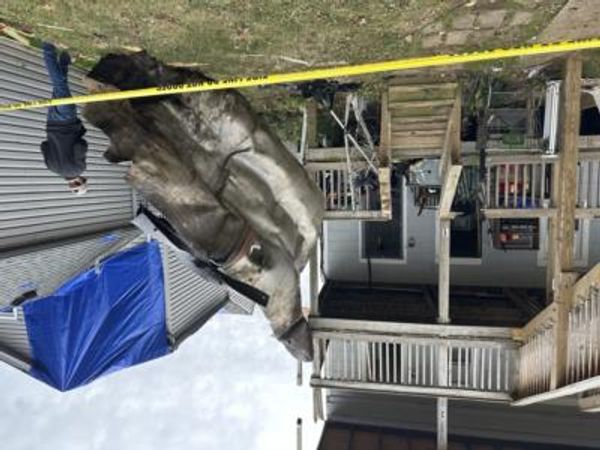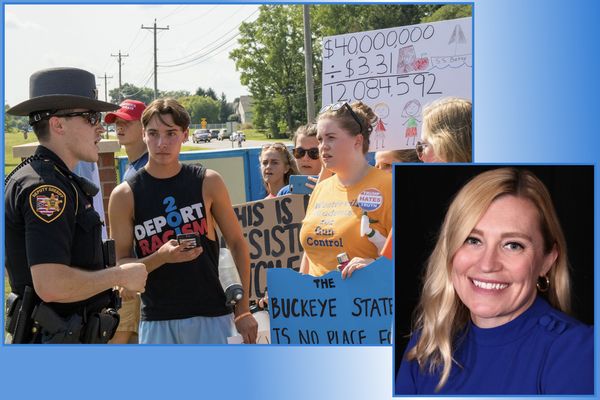
On New Year’s Day in 1981, seven months before Laura Donnelly was born, her Uncle Eugene disappeared from his home in County Down, Northern Ireland, just near the border. He was 26 years old, a “bit of a tearaway” who had fallen in with the IRA.
Three years later, his body was discovered by a dog-walker in a bog across the border in County Louth – laying to rest, once and for all, the stories his family had been fed after his disappearance about how he had been spotted alive and well. This is almost the most shocking aspect of the story and, says Donnelly, was a common IRA ploy at the time: “They did it to keep the wound open. It was a form of torture really, because it stops people from being able to mourn properly.”
Theatregoers who have been lucky enough to bag tickets for Jez Butterworth’s hit play The Ferryman – just transferred from the Royal Court to the West End – will recognise the story. A similar disappearance has shattered the lives of the Carney family, throwing widowed Caitlin and her son on the mercy of her farmer brother-in-law, his sickly wife and their growing brood of children. In the Derry farm kitchen where the play is set in the summer of 1981, three generations fight, feast and glug down whiskey, while the formidable Aunt Patricia obsesses over radio bulletins of Margaret Thatcher condemning the IRA hunger strikers in the Maze prison.
Donnelly plays Caitlin, the sensuous young widow thrown into emotional and physical limbo by her husband’s disappearance. On stage for nearly all of the three-hour-plus running time, Donnelly has garnered some of the best reviews of her career, her “fiery and desolate” performance bursting with secret yearning, as she goes from kitchen-table flirtation with her brother-in-law, played by Paddy Considine, to snotty sobs as the full hopelessness of her situation sinks in.
So how does it feel to get standing ovations for a story that is so raw and close to home? “It’s a really lovely thing,” she says. “So many people from back home are saying, ‘I’ve never heard anything that captures so well how it felt, our language, our spirit.’”

The seed of the play was sown when she was performing in Butterworth’s 2012 chamber piece, The River, at the Royal Court. She was watching a TV programme about “the disappeared” in Northern Ireland and was shocked when her uncle was named as one of them. She mentioned this to Butterworth, then her partner, and he was shocked as well – not just by the murders but by the silence surrounding them.
“I’d sat and watched this whole documentary and it hadn’t occurred to me that he’d be there,” she says. “I knew that my uncle had been killed by the IRA and his body had turned up after a few years, but I hadn’t realised there was this category called the disappeared.”
As a very small child, when she asked about her uncle’s death, she was told he had died in a car crash. When she was older, she was given a sketchy version of the truth. “But that was really it. It says a lot about how we connect, or don’t connect, in Northern Ireland that I went through my teen years and most of my 20s without knowing very much about it.”
Eugene Simons was the brother of her mother, who has since gone on to work as a grief counsellor for outlets including the Wave Trauma Centre, which specialises in helping the partners of people killed in the Troubles. “It wasn’t about my mother being reticent,” says Donnelly. “We just got a sense that it wasn’t something we talked about. I think, either consciously or not, my parents made a decision to really neutralise the politics in our family.”

She grew up in Belfast, where her father worked as a GP and the Troubles were a fact of life. “I didn’t realise that helicopters weren’t a constant presence in every city, that police checkpoints and burnt cars weren’t normal.” However, she adds, “I don’t want to claim that I had some sort of difficult upbringing, because I was very lucky to grow up in an area where we wouldn’t have seen a lot of trouble. But I had friends who lived in parts of the city where they would be raided in the night and forced out of their beds.”
She went to a Catholic grammar school and, although there was no theatre in her family, caught the acting bug early, appearing in amateur dramatics and in “Irish ballet” – a precursor of Riverdance – devised by a visionary dance teacher who would stage “hoppy skippy” versions of Irish myths and legends.
After a childhood of holidays in Scotland, she decided to go to drama school in Glasgow and won a place at the Royal Scottish Academy. Since graduating, she has been in constant demand, making her mark in stage revivals of Brian Friel’s Dancing at Lughnasa and his Philadelphia Here I Come!, while appearing in a run of TV series, including the Scottish time travel saga Outlander, Beowulf and Britannia, set in ancient Rome. “I guess I’ve been attracted to them because the stories tend to be bigger in scale. I like things that are character driven.”
But it is her work with Butterworth that has left the most indelible mark. She was the only member of the original cast to transfer in The River from the 90-seater Royal Court Theatre Upstairs to the 690-seater Circle on the Square on Broadway, playing the skittish Other Woman opposite first Dominic West and then Hugh Jackman. “She has this glowing intensity that illuminates from within,” says director Ian Rickson. “She was so in concert with the part and words that it was like she was channelling. Every performance was alive with curiosity and specificity.”
Donnelly herself defers to the writing. “From the moment I auditioned for The River, I knew the dialogue was something I knew how to speak. It’s incredibly easy to find the truth, the rhythm and the sense of what Jez writes. He knows how people communicate on an instinctive level, and that’s not as common as you’d think.”
The buzz around Butterworth’s work – which had built steadily over a decade of plays such as Mojo, Parlour Song and Jerusalem, and been so knowingly ramped up by the boutique staging of The River – made the stakes extra high for The Ferryman. He built the back story from several accounts of the Disappeared, but also drew on his own Anglo-Irish family for some of the characters.
A cast full of children and animals heightened the sense of jeopardy – with Butterworth and Donnelly volunteering their own nine-month-old daughter for training in how to carry a real baby up and down a vertiginously steep flight of stairs. “We’d been rehearsing the play for weeks but had no idea what we had until the first preview when the audience rose to its feet,” says Donnelly. It became the fastest-selling play in the history of the Royal Court.

She dismisses grumbles from some quarters that that The Ferryman has its share of Irish cliches. “The thing I love is how he takes very big themes and characters – almost archetypes – and uses them to say something about the shared human experience; how he combines the mythic with the modern. It makes his work more like songs than plays. They speak to the soul first and the brain second.”
Her mother has seen the show several times and at first found it hard to bear. “But now she loves it and is really grateful to have the spotlight shone on something that has really never had any attention, especially over there. Silence is a dangerous and a painful thing.”
• The Ferryman is at the Gielgud, London, until 6 January. Box office: 0844-482 5130.







